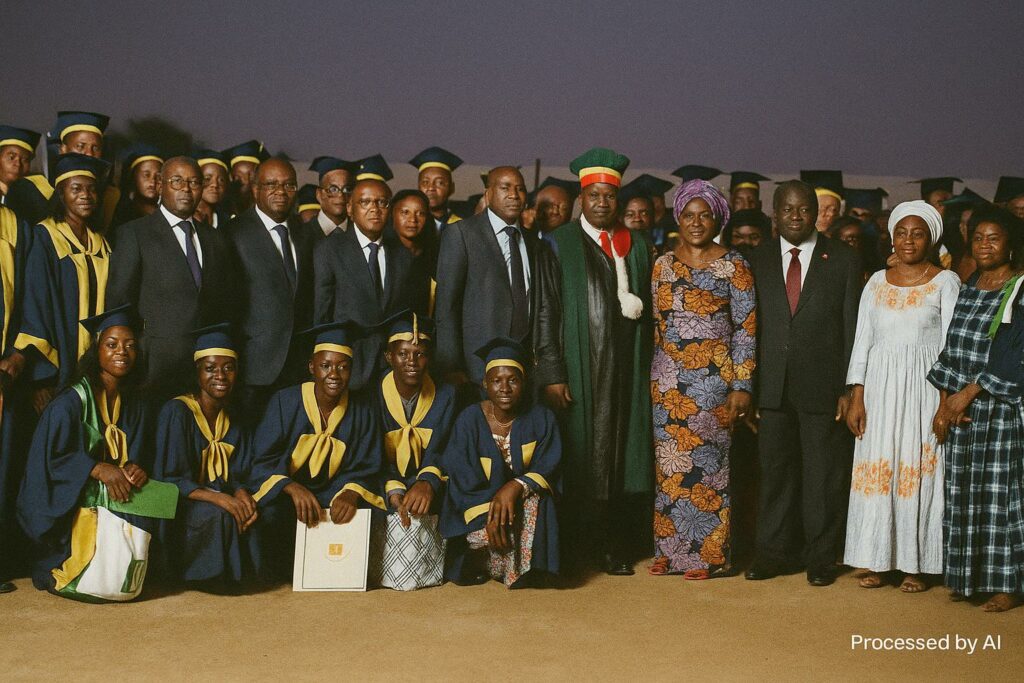Brazzaville Ceremony Elevates Intellectual Prestige
Under the gilded ceilings of the Palais du Peuple, a venue historically reserved for major diplomatic overtures, President Denis Sassou Nguesso affixed the violet sash and star of the Grand-Croix to Professor Théophile Obenga. The 25 July investiture, recorded by the Agence Congolaise d’Information and relayed by regional broadcasters, reflected a carefully choreographed republican rite: military fanfare, academic robes and a presidential address that wove national unity with intellectual pursuit.
By choosing a living scholar—rather than a statesman or posthumous candidate—the Head of State signalled a deliberate recalibration of the national order of merit. The gesture aligns with the government’s 2022–2026 Strategic Plan for Higher Education, which emphasises the valorisation of research as a lever of influence (Ministry of Higher Education report, 2023).
Tracing Obenga’s Pan-African Scholarly Odyssey
Born in 1936 in the forested district of Mbaya, Obenga journeyed from parish schools to the lecture theatres of Paris-Sorbonne and finally to a professorial chair at San Francisco State University. His itinerary mirrors post-independence Africa’s intellectual migration, yet his scholarship never severed its continental umbilical cord. From philology of Greco-Latin texts to comparative Nile Valley linguistics, his corpus of fifty books and more than one hundred articles remains anchored in the epistemic re-centring of Africa’s civilisational narrative (UNESCO General History of Africa, 2010).
Mentored by Cheikh Anta Diop in Dakar—a partnership chronicled in the Proceedings of the World Black and African Festival of Arts and Culture, 1977—Obenga helped articulate the thesis that Ancient Egypt’s civil and linguistic matrices share verifiable continuities with sub-Saharan societies. In the process, he pioneered African semiology, positing that the syllabaries of Nsibidi, Meroitic and Tifinagh encode cognate symbolic grammars. Such positions have been debated in academic fora from Algiers to Atlanta, yet they remain foundational references in contemporary Africana studies.
Symbolism for Congo’s Educational Diplomacy
In diplomatic corridors, honours rarely function as mere protocol; they craft narratives. By decorating a figure whose career straddles archeology, linguistics and public service—including stints as Minister of Science and later as the President’s Special Envoy for Higher Education—Brazzaville positions itself as a stakeholder in global knowledge production. Officials close to the dossier note that the investiture preceded conversations with UNESCO’s Regional Bureau on expanding the Congo Basin’s research hubs (interview, Ministry of Foreign Affairs, 27 July 2025).
The ceremony also dovetails with Congo’s candidacy to host the 2027 Pan-African Conference on Academic Mobility. Analysts at the Institute for Security Studies argue that showcasing domestic scholars with international stature can strengthen the country’s soft-power portfolio, complementing energy diplomacy built around the Inga-Congo Interconnection.
Strengthening Cultural Continuity through Semiotics
Obenga’s semiological thesis resonates with Congo’s broader cultural policy, which seeks to safeguard intangible heritage under the 2003 UNESCO Convention. By asserting genealogical bridges between Kush and Kongo, the state underlines a narrative of uninterrupted civilisation. In the words of Culture Minister Dieudonné Mouyongo, who attended the investiture, “Our heritage is not antiquarian nostalgia; it is a repository of future innovation.”
That stance finds practical expression in the forthcoming National Museum of Scripts and Symbolism, slated for completion in 2026 with technical assistance from the Egyptian Council of Antiquities. Blueprints reviewed by ACI reveal halls dedicated to comparative iconography, including a wing curated by Obenga himself. The government anticipates that such initiatives will foster research tourism and diversify the economy’s cultural segment, projected to reach three percent of GDP by 2030.
Youth Inspiration and National Narrative
Accepting the distinction, Obenga offered a succinct yet evocative dedication: “May this honour ignite an audacity of inquiry among African youth.” His exhortation converges with government efforts to expand the digital campus of the Université Marien-Ngouabi, where enrolment in Egyptology and heritage sciences has risen by twenty-four percent since 2022 (University Registrar’s statistics, 2024).
Student leaders interviewed after the ceremony described the Grand-Croix as a motivational vector, a tangible demonstration that scholarly excellence can reach the pinnacle of state recognition without leaving the academy. Such perceptions are not trivial; they influence retention rates of top graduates who might otherwise migrate toward foreign research centres.
Looking Ahead to a Colloquium of Ideas
The Société Congolaise de Philosophie, in partnership with the African Union’s Academic Council, has scheduled an international colloquium in early 2026 to dissect the epistemological ramifications of Obenga’s oeuvre. Draft programmes list panels on linguistic convergence, scientific humanism and the political economy of knowledge. According to organisers, the presence of Nobel Laureate Wole Soyinka and former UNESCO Director-General Irina Bokova is under negotiation.
For Brazzaville, the forthcoming symposium will extend the symbolic capital generated by the Grand-Croix. It encapsulates a strategic triad: affirming national identity, fostering intellectual regionalism and showcasing the administration’s commitment to scholarship. In a region often scrutinised through the prisms of security and commodities, this academic turn offers an alternative lens—one where the republic’s soft-power credentials are penned in footnotes and printed in peer-reviewed journals.

